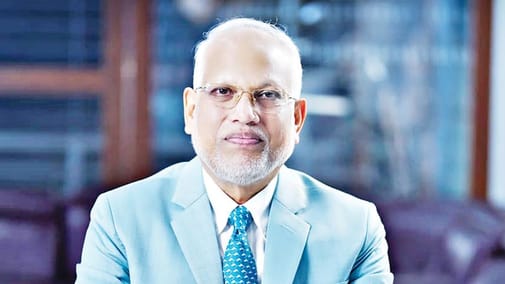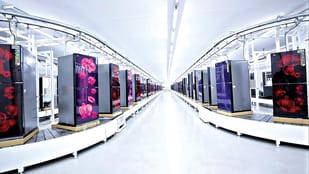Walton’s wind of change

SM Shamsul Alam
Chairman of Walton Hi-Tech Industries
Children of the 1990s can relate to the fact that many of them used to rush to their neighbour's house to watch their preferred television programmes, as televisions were not available in most homes.
Refrigerators too were an uncommon appliance in households at that time. This scenario has now completely changed, as most households now have TVs and refrigerators.
This is, without a doubt, a benefit of goods being produced within the country instead of being imported from abroad. Products became affordable through local manufacturing, while rising income levels also enabled people to purchase the goods.
Walton is one of the companies that pioneered manufacturing electronic products and home appliances within the country.
"When we started manufacturing these products in the country, many people didn't even think of purchasing them," said SM Shamsul Alam, chairman of Walton Hi-Tech Industries PLC.
The company even struggled to hire any local engineer with experience and expertise in designing a refrigerator factory.
Alam and his four brothers were advised by their father to always work for the wellbeing of the country and its people. So, in 2000, they aimed to focus on manufacturing products that were not produced within the country in an almost fully import-driven industry.
"Our father, in one sense, pressured us to go for manufacturing so that the country could benefit and so that a huge number of jobs could be created," said Alam.
Later, Walton hired around 500 engineers and imparted skills through international trainers to make the dream of local manufacturing come true.
The dream came true in 2008 when the company became a manufacturer of electronic products and home appliances. Later, it went beyond the local market by exporting goods to various countries and earning foreign currency.

Walton sells products in several countries under its own brand. "This is a big achievement for the country and the company," said Alam.
Walton's story is one of the most striking corporate journeys in Bangladesh's recent history.
From a modest start in electronics and appliances, the company has grown into a household name across the country, commanding a loyal customer base at home while expanding into international markets.
The conglomerate is fulfilling its vision and proving the usefulness of its name, which it says means "wind of alteration," through its successful contribution to making electric and electronic products and home appliances available in almost all households in the country irrespective of income levels.
It was also successful in altering the industry from being import-based to branching out into exports.
On the other hand, Bangladesh's manufacturing sector was dominated by garments for years. The idea that a homegrown electronics brand could rival international giants seemed far-fetched. Yet Walton proved otherwise.
Walton is one of the companies that pioneered manufacturing electronic products and home appliances within the country
Its gross exports amounted to Tk 45 crore in the first nine months of fiscal year 2024-25 (FY25). It was Tk 27 crore in the same period of the previous year.
Through huge investment, vertical integration, and an unyielding focus on affordability, it has transformed the consumer electronics landscape.
Refrigerators, televisions, and later smartphones bearing the Walton logo entered millions of homes, challenging imports and shifting consumer behaviour.
Recently, it started producing lifts, which were another import-based product in the country.
In the late 2000s, the sector was heavily dependent on imported brands.
By localising production, cutting costs, and maintaining quality, Walton addressed a gap in the market—bringing reliable products within the reach of the middle-income segment of society, said Alam.
Locally manufactured and assembled televisions now dominate the country's TV market, with an enormous 90 percent market share—a significant change from just a decade ago, when Bangladesh was fully dependent on imports.
According to industry insiders, the government significantly reduced import duties for electronics manufacturers and assemblers in FY 2010-11 to facilitate growth and attract investment to this sector.
The market has been growing by around 12 percent since the tax cut, thanks to the availability of electricity in both urban and rural areas as well as an increase in the purchasing power of people.
Now, the total market is worth around Tk 5,000 crore, with an average local demand of over 10 lakh units per year.
"The main reasons behind the products becoming affordable for people are that they were being manufactured within the country and labour costs were low," said Alam, adding that labour costs in Bangladesh were low compared to those in other countries.
"On the other hand, if they had imported the final product, it would have required a huge amount in carrying costs," he said. "Now, they are adding value within the country and bringing in only raw materials, so the overall cost of goods becomes lower than imported ones."
But has Walton really been able to change how people view home appliances?
In essence, there has been a dramatic shift, as home appliances are now viewed by families as a necessity, whereas earlier those were considered luxury products.
"Once it was a fully import-dependent sector in the country, whereas now 90 percent of the demand is met by local companies," said Alam.
Now, Walton itself meets 60 percent to 70 percent of the local demand every year. Moreover, the local giant is now exporting these products to around 50 countries.
Its success inspired confidence that Bangladeshi companies could break free from the identity of predominantly being garment manufacturers and compete globally in manufacturing.
It also created ripple effects—new suppliers, jobs, and skills training followed Walton's rise, contributing to industrial diversification. For the first time, "Made in Bangladesh" electronics became a serious contender.
What cannot be denied is the cultural shift Walton brought about. In villages and cities alike, its products became symbols of aspiration. The affordability of its products ensured the entry of fridges and TVs into almost all houses in the country.
The company proved that local entrepreneurship, when paired with vision and strategy, could scale beyond expectations.
Walton may not have rewritten the patterns of the economy, but it certainly caused a storm of change in the way Bangladeshis perceive their own potential.
The most important alteration came in people's mindset. Once, people could not keep faith in local companies when it came to such technology-based industries.
However, now people have faith in local companies when choosing electronic and home appliance products.
In the end, perhaps the phrase "wind of alteration" is best seen not as a literal claim but as a symbolic breakthrough.
Walton's rise shows that even in a country weighed down by financial turbulence and governance challenges, a determined company can carve out its own niche of success.
Regarding the challenges, Alam said policy support was necessary to give a boost to the industry.
For this type of industry, it is especially difficult to avail efficient manpower. Moreover, when companies provide training to manpower and the new hires become efficient, some leave the country.
"An employee does not provide yields in the first couple of years due to inexperience. When they become capable of making contributions after receiving training, they migrate abroad. It is costly and painful," he said.
He said one of the turning points for the business was pioneering in manufacturing refrigerators, motorcycles, compressors, and lifts.
This gave them some advantages, such as being able to keep production costs low, which helped them grab the market, he said.
Regarding the quality of Walton's products, he claimed it was now better than that of imported products.
More importantly, Walton is producing even the screws of the products, as the scope of outsourcing is limited here, while foreign companies outsource most of their spare parts from abroad.
Walton is focusing on research and development (R&D), and the company already has more than 1,000 engineers. "Without R&D, a manufacturing company like us cannot grow fast."
Regarding the recent business scenario, he said Walton's loan portfolio was comparatively small, so rising interest rates in the banking sector did not have much of an impact.
However, the local currency was devalued to a huge extent, and industries faced some detrimental situations over the past year, he said.
Walton's sales grew 7 percent year-on-year to Tk 4,597 crore in the first nine months of FY25. In the same period, its profits dropped 8 percent to Tk 696 crore, according to the financial report of the company.
Analysis of data from Dhaka Stock Exchange shows that most listed firms saw an erosion in their profits during this period.
Alam urged the government to ensure policy support for industries.
He said the overall environment should be conducive for business, port management should be improved, stable electricity and gas should be ensured, and other scopes for enhancing competitiveness should be provided.




 For all latest news, follow The Daily Star's Google News channel.
For all latest news, follow The Daily Star's Google News channel.
Comments